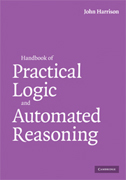
The sheer complexity of computer systems has meant that automated reasoning,i.e. the ability of computers to perform logical inference, has become a vital component of program construction and of programming language design. This book meets the demand for a self-contained and broad-based account of the concepts, the machinery and the use of automated reasoning. The mathematical logic foundations are described in conjunction with practical application, all with the minimum of prerequisites. The approach is constructive, concrete and algorithmic: a key feature is that methods are described with reference to actual implementations (for which code is supplied) that readers can use, modify and experiment with. This book is ideally suited for those seeking a one-stop source for the general area of automated reasoning. It can be used as a reference, or as a place to learn the fundamentals, either in conjunction with advanced courses or for self study. INDICE: Preface; Ideological orientation; Acknowledgements; How to read this book; 1. Introduction; 2. Propositional logic; 3. First-order logic; 4. Equality; 5. Decidable problems; 6. Interactive theorem proving; 7. Limitations; Appendix 1. Mathematical background; Appendix 2. OCaml made light of; Appendix3. Parsing and printing of formulas; References; Index.
- ISBN: 978-0-521-89957-4
- Editorial: Cambridge University
- Encuadernacion: Cartoné
- Páginas: 681
- Fecha Publicación: 12/03/2009
- Nº Volúmenes: 1
- Idioma: Inglés
